Booking guests is an exhausting process which can often challenge and frustrate sports radio producers. Some people love the thrill of the chase and some do not but most agree that when a high profile name appears on a talk show and provides good content, it can make a huge difference. It has also shown to pay dividends for radio stations when it comes to delivering ratings.
During my career I’ve been fortunate to be strong in this department and what I’ve learned is that persistence pays off and thinking big and planning ahead are critical to your success. While at ESPN Radio, I’d sometimes book 48 guests over the span of three six-hour shows and it was intense. Booking 48 guests didn’t mean we had a good show, it just simply meant we booked a lot of people.
 Now for that particular show (GameNight), the format was built around capturing quick post-game conversations and interviews with people all over the country on the biggest sports stories of the day and that’s a lot different than a weekday talk show where the focus is on topic building, connecting with listeners and conducting conversations with people who fit the stories we care most about.
Now for that particular show (GameNight), the format was built around capturing quick post-game conversations and interviews with people all over the country on the biggest sports stories of the day and that’s a lot different than a weekday talk show where the focus is on topic building, connecting with listeners and conducting conversations with people who fit the stories we care most about.
The reason I was able to handle the workload of guest booking on GameNight had a lot to do with my mindset. I spent my first years in this business working in a smaller market where I had to scratch and claw for every guest I got and I learned fast that if you want big things to happen you better be prepared to out-work and out-think people. Nobody cares about the challenges you have in front of you, only the results you deliver.
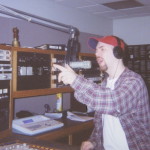 Back then I hosted my own daily talk show about an hour north of NYC and I knew that I would be measured against every station in NYC so if I didn’t have big things in place then I stood no chance. I’d drive to Yankees, Mets, Giants, Jets, Nets, Knicks and Rangers games and personally talk to people before and after games to build relationships. I’d also call team hotels, team PR people, agents, family members, memorabilia dealers, other media members throughout the country and anyone else who I thought could help me with landing people on my talk show.
Back then I hosted my own daily talk show about an hour north of NYC and I knew that I would be measured against every station in NYC so if I didn’t have big things in place then I stood no chance. I’d drive to Yankees, Mets, Giants, Jets, Nets, Knicks and Rangers games and personally talk to people before and after games to build relationships. I’d also call team hotels, team PR people, agents, family members, memorabilia dealers, other media members throughout the country and anyone else who I thought could help me with landing people on my talk show.
When you’re in the producers chair, your host is looking to you each day to help them with enhancing the content experience for the audience. Telling a host that they should talk about the local baseball game from the night before is the equivalent of telling them that you know the sun is yellow. It means nothing and is going to be filed away in the filing cabinet of useless bullshit.
 However, I’ve yet to see a host walk in and hear that a well recognized athlete/coach/media personality has been booked for the show and they’re not excited. From local personalities to a high profile talent such as Dan Patrick, they all get excited when they walk in and know you’ve lined something up they perceive to be strong and it makes them feel even more confident in you as a producer.
However, I’ve yet to see a host walk in and hear that a well recognized athlete/coach/media personality has been booked for the show and they’re not excited. From local personalities to a high profile talent such as Dan Patrick, they all get excited when they walk in and know you’ve lined something up they perceive to be strong and it makes them feel even more confident in you as a producer.
Instantly their wheels start spinning with what questions they should ask, what subjects will generate the biggest reaction out of the audience and what possible material from the conversation will lead to further promotion for the show after it’s over.
If you’re really good at looking ahead, you can come up with tons of possible guest ideas to advance a story and help your show. Case in point, 8 years ago when I first worked in St. Louis I created The Guests Bible. This was a 16-page document with a list of current St. Louis athletes, former St. Louis athletes and analysts from all sports in different cities throughout the country.
I’d tell my producers to use the information in a timely fashion but to always be looking at it and thinking of when it could come into play and benefit them. If anyone on the list was booked and not good on-air I’d encourage them to alert one another so we don’t make the mistake of booking them again.
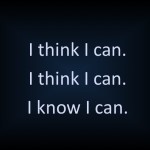 I believe so much of what gets accomplished with booking guests starts and ends with your attitude and ability to strategically game plan for success. Anyone can have a ton of numbers but they only matter if you know your contact list and if you’ve got the ability to think fast and use them when they matter.
I believe so much of what gets accomplished with booking guests starts and ends with your attitude and ability to strategically game plan for success. Anyone can have a ton of numbers but they only matter if you know your contact list and if you’ve got the ability to think fast and use them when they matter.
Being persistent and recognizing the benefit a great guest can provide your show also plays a vital role. Too many people are beaten before they start because they view the responsibility as annoying or frustrating and they hate to have to chase people but whether you enjoy it or not, it gets your hosts and your audience excited and it’s up to you to come thru.
 Rather than listen to me preach about it though, I’ve reached out to three people I know in the industry to pick their brains on how they view guests and their importance in talk shows and what they’ve done to help land them on their respective program.
Rather than listen to me preach about it though, I’ve reached out to three people I know in the industry to pick their brains on how they view guests and their importance in talk shows and what they’ve done to help land them on their respective program.
What I think is interesting is that all three of these guys have worked in different markets and they each have a different approach and philosophy on why guests do/don’t matter. I hope you’ll find their responses as helpful and informative as I did.
Today’s featured experts are as follows:
- Ben Boyd – Executive Producer – KMOX in St. Louis
- Jonathan Libbey – Producer – 95.7 The Game in San Francisco
- Bernard Bokenyi – Former PD/Producer – 750 The Game/1080 The Fan in Portland; WKNR in Cleveland; Sporting News Radio
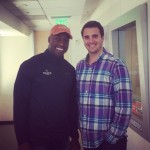 How much do you love booking guests for your shows? Why or why not?
How much do you love booking guests for your shows? Why or why not?
Libbey: When it works out, I love it! Especially when you land a big fish and you know how much time and effort went into it. The frustration comes when you hit a dry spell, or nothing seems to being going your way. But those periods ebb and flow and you can learn how to mitigate the tougher times as much as possible.
Boyd: Booking guests can be very rewarding but also very distressing. There is nothing better than landing a huge guest, but it is a what have you done for me lately business. You can’t sit back and enjoy your work for long because you have to book your next show.
Bokenyi: For me personally there is WAY too much of an emphasis put on booking “BIG NAME” guests on shows. There was no enjoyment for me efforting the big names as very rarely did you have results on them. Too often guests are viewed as a necessity to make great radio and that is not the case. You have to put way too much time into it and even when you book some athletes, the interview is awful as they don’t care to be spending the time. I would rather spend time developing unique content and focus on guests that will be good on air, no matter what walk of life they come from.
 How many calls, e-mails and texts do you send out on a daily/weekly basis in order to land great guests for your shows?
How many calls, e-mails and texts do you send out on a daily/weekly basis in order to land great guests for your shows?
Boyd: I prefer to email and text people whenever possible instead of calling so they can read my pitch about coming on instead of just saying no or hanging up before hearing why they should join us. Whether I call or email though really depends on how far in advance I reach out to them. It’s hard to quantify how many times I reach out to people per day/week because it’s really a non-stop process because there is always another show coming up the next day/week.
Libbey: Depending how many guests I need for the upcoming week and how much I am able to look further down the road, I know I’ll roughly need to get out at least 7-8 requests per 1 guest spot I need to fill. More if I am aiming for guests I have no contact info on / haven’t had on before.
Bokenyi: I would send out well over 100 messages a week between emails, phone calls and other methods. You have to find multiple ways to connect to people. Twitter had yet to take off when I was booking guests but now that is another method of reaching out to people. You can’t just leave it at a phone call or two for a specific guest. Do they have a family member you can track down? Can you connect with that family member? Does the athlete have a charitable organization or foundation? There are so many ways you can make connections.
 When pursuing A-List guests for your show, what are some of the avenues you explore to try and book someone?
When pursuing A-List guests for your show, what are some of the avenues you explore to try and book someone?
Bokenyi: For current players/coaches, the first route will always be PR or the SID. As noted above, finding foundations is a great way to get an interview. You can go the agent route but from my experience, the results there are scarce. If you can’t get anywhere with PR, I would look at personal web pages, foundations, charities and social media. Something as simples as “Kobe Bryant Charity” as a Google search can get you plenty of options to look at. Find out what they’ve been involved with. For retired players/coaches, things are much easier. You can follow a lot of the same methods. Another route to look at is books. A-List guests will do media tours for books and that can be a great route to pursue. Get on mailing lists, the more the merrier. Any sports agency, publishing house, PR firm and beyond.
Libbey: Look for outlets who have interviewed the guest I want, and see if they can offer me insight into how they got them. i.e. is there another producer out there who has already done the leg work who I can get in contact with to help me? Look at the guest’s personal twitter, facebook, website, business, foundation, or charity for contact info or for something they might want to promote. Look for business / endorsement partnerships the guest has that they could be persuaded to come on to promote. Any other reasons they may be interested in publicity? (upcoming events, charities, autograph signings, products)
Boyd: Publicists, Team PR people, Agents, previous coaches, media in the local market
 What are the biggest benefits of landing top flight guests on your show?
What are the biggest benefits of landing top flight guests on your show?
Libbey: It energizes everyone associated with the show. It can drive excitement and energy for an entire day or even more, among producer, hosts, audience, execs, and others. It can deliver more of an impact than almost anything else the show can do. It can drive tune-ins, but also create buzz that makes people want to tune in. It also builds a lasting sense of importance, relevance, and cache for the show.
Boyd: One of the biggest benefits is the reputation your show can get — listeners who want to hear big guests will tune into your show. It also helps your relationship with your host because of how much pride your host has in his/her show. You are helping them to put out the best product they can, and they know you are working hard and want to be the best. Big time guests can boost the reputation of your station and yourself, and obviously can increase your ratings if you are able to publicize the appearance.
Bokenyi: I always wanted to challenge talent to be engaging and have fun and landing a quality interview can do that very effectively. In this day and age of digital media, the on-air interview is just the first step. That audio now lives forever through podcasting and social media. Get legs out of the interview. Make sure that it’s available for download as soon as possible. First of all you can encode audio to have PPM available for a window of time which can help with ratings. Second, you want people to know what they missed and to keep seeking it out. If somebody is not able to listen to your show live but can through podcast, what’s the difference? Yes you want to promote content, but keep in mind people have jobs, lives, commitments and your schedule does not always fit in to their lives. Allow them to fit your content into their lives and you will find success.
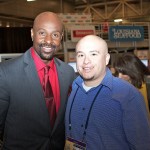 Once a guest is booked, what else do you do as a Producer to take advantage of the opportunity?
Once a guest is booked, what else do you do as a Producer to take advantage of the opportunity?
Boyd: I like to promote guests on Facebook, Twitter, online message boards, etc. It is great if you can get a pro team to tweet out the appearance by their player, and it is always nice when a guest retweets your tweet to their followers.
Libbey: Publicize it as much as possible via on-air mentions, twitter, facebook, text alerts, etc. Try to generate as much buzz going into it as possible. Make sure hosts and producer are on the same page with what we want the spot to sound like and what we want it to deliver. Publicize and re-purpose any relevant clips from the interview on twitter, facebook, on-air, or via distribution to other pertinent persons / outlets.
Bokenyi: The bottom line with guest booking is to know your hosts. Some are good at handling the young athlete that doesn’t really want to talk. Others have different strengths. To me, any interview you book must add something of depth to the show. There are plenty of A-list guests that won’t add depth if the interview itself is not engaging. The only time you should ever send out a press release on an interview is when it is regarding a hot topic that is current and will truly get people to say “WOW”. Test it out around the office. Grab a sales rep, intern, production person, traffic or promotions staffer. See if they give the reaction to something you want ESPN to get. You have to pick and choose however because you don’t want to overdo it.
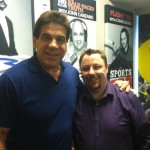 How often do you work in advance on guest booking? What’s your strategy when it comes to booking ahead?
How often do you work in advance on guest booking? What’s your strategy when it comes to booking ahead?
Bokenyi: You have to always look at the upcoming opponents and games. For athletes and coaches, that is the only way to go, especially in season. You always however want to have a stable of interviews you are working on that are not necessarily time sensitive so you can have things to supplement what you are doing on a daily/weekly basis. During football season, you have to work at least a month ahead for your planning purposes. Depending on the guest, you may have to work even farther out. For example, if you want Richard Sherman during the 49ers/Seahawks week, you sure as heck better have been working on it for six months to make it happen during the week of the game.
Libbey: The day-to-day grind of short-term guest booking takes up the majority of the time, but I always want to have at least some long-term ideas / requests in the works. Always have some targets that are “evergreen” because they are relevant no matter what time of year. And also look ahead to upcoming games / series and target guests that are very difficult to get but would deliver a huge impact. When free(er) time presents itself, working ahead usually pays off, though it may take a long time for benefits to materialize.
Boyd: I always try to book ahead. I think most guests like when they are booked in advance instead of feeling like last minute additions. I always see what events are coming up on the calendar and try to reach out to people a few days to a week in advance.
 What is the biggest misconception of having a big rolodex or e-mail distribution list?
What is the biggest misconception of having a big rolodex or e-mail distribution list?
Libbey: That having a phone number or contact info for a guest means you can easily book that guest. The farther up the guest ladder you go, the less people want to be contacted directly. It’s a great feeling to get the direct number for a big fish, but it doesn’t necessarily mean they will ever let you book them directly. You will still probably have to go through proper channels to get them to agree to come on. )But in a push-comes-to-shove or breaking news situation, it can come in extremely handy.)
Boyd: People think if you have everyone’s number, you will have no problem getting great guests, but it doesn’t matter what numbers you have if you can’t get people to respond. The biggest benefit to having a big rolodex is for breaking news. Big name guests are typically easier to get on when there is breaking news or when there is a big event like Hall of Fame inductions.
Bokenyi: The term rolodex is a joke. In 2001, I worked at Sporting News Radio when we had Barry Bonds on. He originally called on his agent’s cell phone but the connection dropped. We had caller ID and I grabbed the first phone number. When the call cut off he called back from a different number, his personal cell phone. So as a good producer I grabbed that number. I now had Barry Bonds’ cell phone as a part of my “rolodex”. I gave the number to all of the guest booking crew so I could boost my ego and get a few “that a boys” from everyone. A few months later, a fellow producer tried to call Bobby Bonds and of course made the mistake of calling Barry. Needless to say he was a little unpleasant. The phone was on speaker and I heard the exact result of having Barry Bonds’ cell phone in your rolodex. Bonds managed to get about ten F-Bombs in during 20 seconds or so. Needless to say that phone number was changed within minutes. Point of the story – having a rolodex is silly antiquated thinking from years gone by. What you NEED is the ability to get the guest booked. Many current players, not even A-listers will tell PR that they got called directly so if you’re going to call someone directly, you better be sure it won’t jeopardize relationships that your station has.
 What advice do you want to pass along on guest booking to fellow producers who struggle at it or to someone who’s breaking into the industry and looking to learn it?
What advice do you want to pass along on guest booking to fellow producers who struggle at it or to someone who’s breaking into the industry and looking to learn it?
Boyd: There are many different avenues of tracking someone down. I see too many interns/producers give up too easily when trying to find someone. Keep reaching out to other people who can help you connect. You can find out so much information online about friends/family members/high school or college coaches, and those people are usually willing to help set something up.
Libbey: Persistence is huge, don’t let yourself get discouraged, working ahead is your best friend, and creativity is massively beneficial. Creativity with guest ideas and also in terms of abstract / unconventional ways to contact people. Save the contact info of every person you ever have on or who helps you in any way. Don’t get lazy, always stay in the mindset of challenging yourself to keep expanding your rolodex and getting on people you’ve never had before. Build contacts with other producers and always be open to trading info with them, and in that way you can essentially double / triple your rolodex.
Bokenyi: Learn patience quickly! While you are working hard on big name guests, you have to find other content on a daily basis that will enhance your show. Being a producer is SO MUCH more than booking guests. That is just one part of the equation. You will have days when you land two great interviews in a day because it just works that way sometimes. You then may go weeks before your next A-list interview. To me, booking guests should be about 10% or so of what makes a good show. Now I know there will be plenty that disagree with me on that, but I speak from experience. As a young producer, find out more about your talent than the audience knows and find ways to get that out of them on the air. Push their buttons and be confident. Always do it with a smile and you will succeed.
The Key Takeaways:
- Be persistent and be patient
- Be active with a ton of requests and follow up
- Know your contact list and use it in a timely fashion
- Podcast and promote the interview even after it’s over
- Know your hosts and what type of guests fit them best
- Whether it’s annoying or frustrating, recognize its value to helping your show
- Explore various avenues to book guests; there are tons of ways to book people
- Don’t book people who just fill up segments, make the segment opportunities count
You can correspond with our three featured experts by reaching out to them on Twitter. Make sure to add @BenjaminHBoyd @BernardBokenyi and @Jlib21.

Jason Barrett is the Founder and CEO of Barrett Media. The company launched in September 2015 and has provided consulting services to America’s top audio and video brands, while simultaneously covering the media industry at BarrettMedia.com, becoming a daily destination for media professionals. Prior to Barrett Media, Jason built and programmed 95.7 The Game in San Francisco, and 101 ESPN in St. Louis. He was also the first sports programmer for SportsTalk 950 in Philadelphia, which later became 97.5 The Fanatic. Barrett also led 590 The Fan KFNS in St. Louis, and ESPN 1340/1390 in Poughkeepsie, NY, and worked on-air and behind the scenes at 101.5 WPDH, WTBQ 1110AM, and WPYX 106.5. He also spent two years at ESPN Radio in Bristol, CT producing ‘The Dan Patrick Show’ and ‘GameNight’. JB can be reached on Twitter @SportsRadioPD or by email at Jason@BarrettMedia.com.



